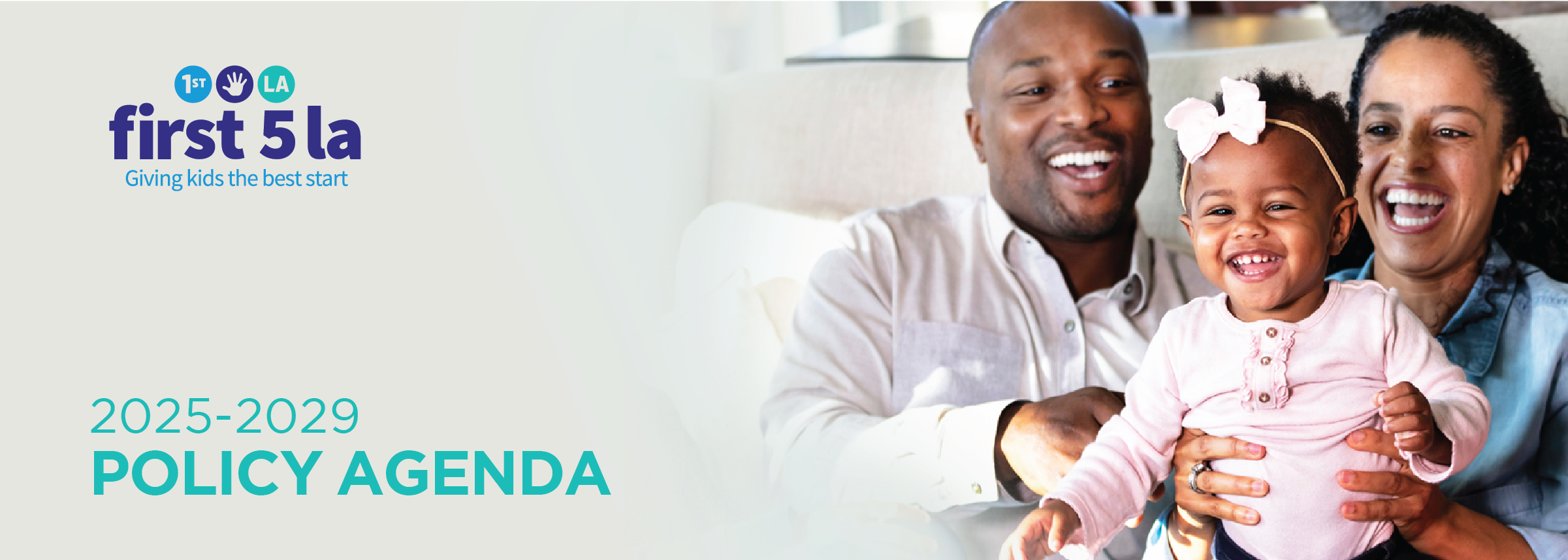
First 5 LA’s Policy Agenda serves as a cornerstone document guiding the organization’s policy and advocacy
efforts by outlining federal, state and local priorities. As such, the Policy Agenda adopts a multi-year framework
for 2025-2029, integrating the goals and objectives of First 5 LA’s 2024-2029 Strategic Plan, which seeks to
advance change such that children prenatal to age 5 and their families have their basic needs met, nurturing
environments, and a foundation for lifelong success. Rooted in the organization’s values of impact, equity,
partnership, and integrity, the 2025-2029 Policy Agenda directs strategic decisions, policy priorities and advocacy
efforts to drive meaningful change and impact needed to ensure every child can thrive.
To actualize the goals and objectives set out in the 2024-2029 Strategic Plan and the priorities of the 2025-2029
Policy Agenda, First 5 LA uses a targeted universalism approach. Targeted universalism is a systemic approach
that identifies universal goals while using targeted strategies to achieve them. The Policy Agenda is anchored in
the three universal goals identified in the strategic plan, which we believe are necessary for every child to reach
their full developmental potential during the critical years of prenatal to age 5. Alongside partners, communities,
and families, we have worked to identify targeted tactics to elevate equity and address the needs of those most
affected by disparities.
Grounded in this shared understanding, First 5 LA seeks to advance the following goals and policy priorities:
Children prenatal to age 5
and their families have their
basic needs met.
- Support policies to address
the access, sustainability and
accountability of perinatal care
systems to reduce maternal
and infant mortality and ensure
healthy and joyous births. - Strengthen safety net policies
that provide long-term support
to reduce poverty and promote
economic stability. - Promote comprehensive
housing policies and systems to ensure access to stable homes.
.
Children prenatal to age 5
have nurturing relationships
and environments.
- Ensure policy efforts increase
mental health screening,
treatment and accountability
to address challenges faced by
birthing and postpartum people. - Promote policies and practices
that increase access to healthy
food options and food security. - Elevate policies aimed at
enhancing and funding access
to safe parks and open spaces.
Children prenatal to age 5
have a solid foundation for
well-being, lifelong learning
and success.
-
Advance policies, practices and
public investment to strengthen the mixed-delivery system and increase family choice. -
Amplify policies that ensure health systems are robust and
coordinated and accountable
for delivering early intervention services. -
Advocate for policies that support culturally affirming care, services and supports that meet diverse needs.
.
Policy Agenda
- Policy Agenda 2025 (PDF)
- Policy Agenda 2024 (PDF)
- Policy Agenda 2023 (PDF)
- Policy Agenda 2022 (PDF)
- Policy Agenda 2021 (PDF)
Advocacy Agenda
.
- 2025 Advocacy Agenda (Updated as of May 21, 2025)
- 2024 Advocacy Agenda (Updated as of June 20, 2024)
- 2023 Advocacy Agenda (Updated as of June 7, 2023)
- 2022 Advocacy Agenda (Updated as of Aug. 9, 2022)
- 2021 Advocacy Agenda (Updated as of May 24, 2021)
- 2020 State and Federal Advocacy Agenda (Updated as of Sept. 20, 2020)
- 2019 State and Federal Advocacy Agenda (Updated as of Oct. 15, 2019)
- 2018 Legislative Agenda